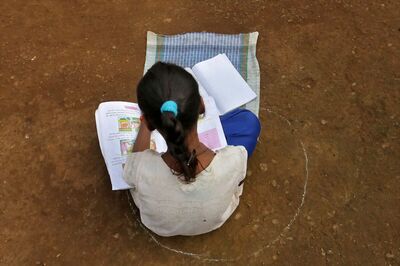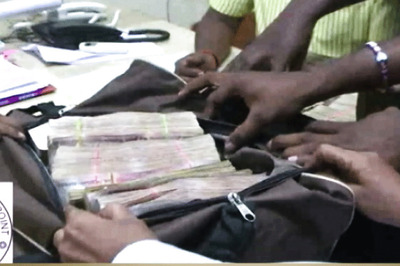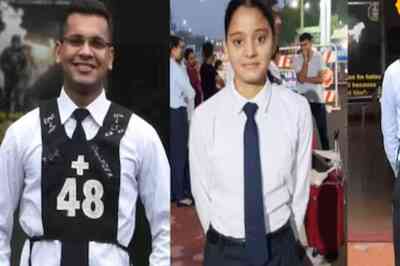
views
Srinagar: As the country polled in the second phase of Lok Sabha elections on Thursday, Jammu and Kashmir’s Srinagar recorded a dismal turnout of 14.1%, reflecting upon the growing indifference of people towards polls which lingers on ground.
While the figure doubled in comparison to the bypolls of 2017 when the voter turnout was 7.1%, there was a staggering drop from the 25% recorded in 2014 elections. The prevailing disenchantment from the right to franchise is largely attributed to the violence that broke out two years ago on polling day, claiming the lives of eight civilians.
While polling is being conducted in five phases in Jammu and Kashmir, which has six Lok Sabha seats, Srinagar and Udhampur cast their votes on Thursday in the second phase.
Despite the political parties campaigning on contentious issues like ‘saving the special status’ of the state, most voters turned their back towards the polling booths. 1, 81,843 votes, that is 14.1 per cent, were polled in the Srinagar parliamentary segment, which includes three districts—Srinagar, Budgam and Gandebal. The highest turnout was recorded in Ganderbal at 16.75%, while Srinagar remained at the lowest with 7.69%.
Why didn’t Srinagar come out to vote?
According to Gowhar Geelani, a senior journalist and political commentator of the Valley, the unpromising turnout is not astonishing, considering the current political climate in the state.
“The low voter turnout in Srinagar is a telling remark of the failure of politicians who, despite their pro-autonomy and pro-people narrative, after the breakup of PDP-BJP coalition government in 2018, have once again failed to attract people to the polling stations,” he said.
Geelani added that Delhi’s “muscular and militaristic Kashmir policy has proved counterproductive on multiple counts,” and is essentially the reason behind the mass poll boycott.
“Despite the massive crackdown on Hurriyat, the ban imposed on pro-independence JKLF and Jamaat-e-Islami, the arrests of 400 members and sympathizers of JeI and the NIA raids -- nothing seems to have worked for the government,” Geelani said.
With the killing of Burhan Wani, the Valley witnessed a resurgence of militancy in the summer of 2016, with scores of youth picking the guns. These tensions have once again heightened, with the banning of Jama’at-e-Islami and JKLF, besides the jailing of secessionists, which the people feel has been done to create a mood for the elections.
In such a backdrop, parties have failed to cut ice with people through their passionate campaigns on the looming threat to Article 370 and 35A, which vests special status to J&K.
PDP, which headed the last government with the BJP at the time when violence hit new levels in Kashmir, is of the opinion that people in Kashmir are in a “continuous state of mourning.”
“Things are not moving. Workers of political parties are not participating in the poll process actively. We were expecting better turnout,” said PDP leader, Waheed-ur-Rahmaan Parra. “The results in parliamentary elections are usually less than that of assembly elections, but never as low as what Srinagar witnessed,” he added.
He feels that the south Kashmir seat, which is seen as a major challenge owing to the restive situation in the region, will also remain unresponsive. “It is not a good sign,” he said.
However, for the National Conference (NC), PDP is to be blamed for the electoral dormancy in the region. “The results should’ve been better, but people have lost faith. They are scared because when they gave the mandate to PDP last time, the party got BJP in fray,” said NC leader Nasir Aslam Wani. “People are alienated because of what PDP did, they don’t want to repose faith in the same process,” he added.
Low voter turnout was recorded in downtown Srinagar and is not surprising, since the area is the hub of protests against the government. The areas of Budgam which used to record good voter percentage, but witnessed killings in the last elections, stayed away from polls this time. Even political parties refrained from camping vociferously in these area and as for the people, they feel that voting again would be akin to “betraying the slain”.
In Srinagar, the Congress has supported NC candidate, Farooq Abdullah, the veteran politician of the state. Abdullah seems to be the potential winner, with the strong base of his party in the area. Meanwhile, voter turnout might not be impressive, but for the Election Commission, it was a good day owing to the overall peaceful situation. “The voter turnout is not that impressive but the polls remained peaceful. That is a big achievement,” J&K’s Chief Election Officer, Shailendra Kumar, told News18.




















Comments
0 comment